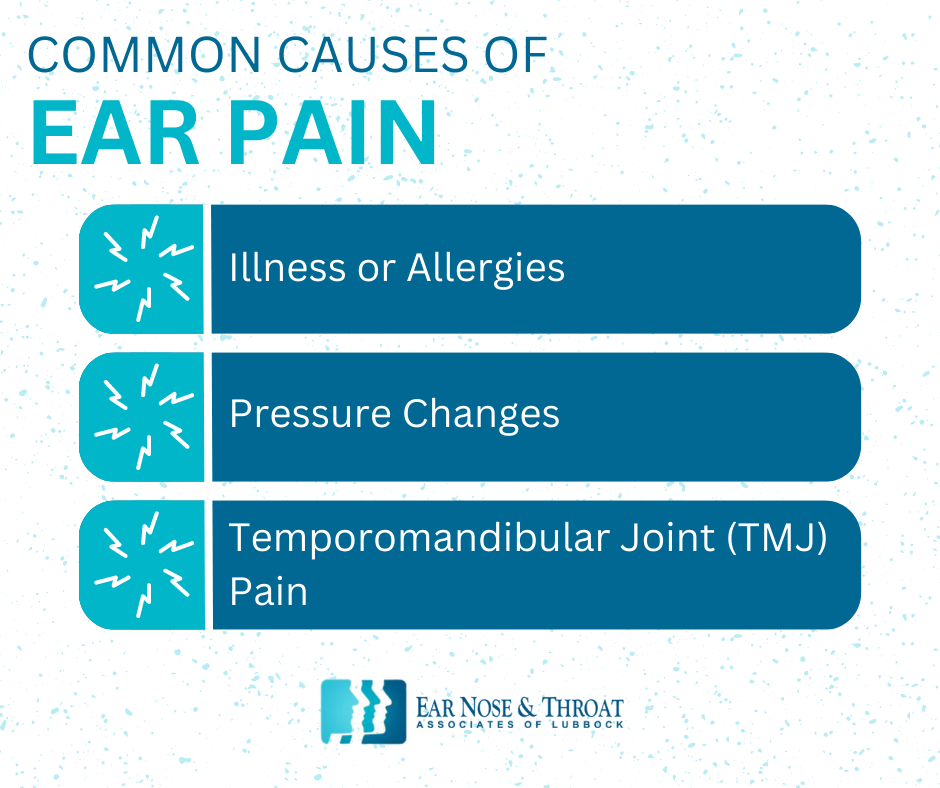Here’s When You Should See a Doctor for Ear Pain

While earaches are common ailments, they can really interfere with your life. Ear pain ranges from annoying to unbearable, and its causes vary — some concerning, some innocuous.
So, how do you know when to go to the doctor for ear pain?
Deciding whether to visit a doctor can be stressful. To help, we created this handy guide with some common causes of ear pain, what to watch for, and when to make that doctor’s appointment.
Common Misconceptions About Ear Pain
Contrary to popular belief, ear pain is not always caused by an ear infection.
Ear pain can come from many sources, like pressure fluctuations from flying or elevation changes, or from fluid buildup in your ear from a cold or allergies.
Ear pain is also very common with temporomandibular joint (TMJ) pain. In fact, it’s the most common cause of ear pain among the patients we see here at ENT Associates of Lubbock.
Can Ear Pain Resolve on Its Own?
In many situations, ear pain resolves on its own within a couple of days. But if the source of the problem remains, the pain will persist.
For example, if your ear pain is due to congestion from a cold, it will likely go away when your cold symptoms subside. On the other hand, if you develop an ear infection, you’ll need treatment to take care of the problem. If the pain stems from ongoing TMJ issues, it could persist for much longer.
When Should I See a Doctor?
If you don’t know the underlying cause, it can be challenging to know when to go to the doctor for ear pain.
Most ear pain resolves within one to two days. If your pain persists past that, consult your general practitioner or ENT. If it lasts up to a week, seeing a doctor is even more important.
More often than not, ear pain has a simple cause and treatment — like an ear infection — but that’s not always the case. Persistent ear pain can sometimes have more sinister causes, like throat cancer. So, even if the discomfort doesn’t seem like a big deal, it’s always best to check in with your doctor and rule out anything serious.

What Are the Most Common Causes of Ear Pain?
Knowing the most common underlying causes can help you understand when to go to the doctor for ear pain and feel confident in your decision. To summarize, these are the three leading causes of ear pain:
Cause #1: Illness or Allergies
When you have a cold, allergies, or congestion caused by illness, fluid can build up behind your eardrum and cause an earache. The pain isn’t necessarily indicative of an ear infection, but it still hurts and can be very uncomfortable.
A sore throat can also cause ear pain even when the ear itself is perfectly fine. This is called referred pain, and should resolve along with the sore throat.
Ear pain from allergies or an illness should resolve on its own as the ailment improves. If it doesn’t, it’s time to see your doctor.
Cause #2: Pressure Changes
On an airplane, the air pressure changes rapidly and your ears don’t always acclimate fast enough. This results in a painful imbalance of pressure between the air behind your eardrum and the air around you.
The same problem can occur when you change elevation rapidly while driving in the mountains or scuba diving.
Ear pain from pressure changes usually resolves quickly, if not immediately. If it lasts beyond a day or two, however, it could indicate swelling or dysfunction related to your eustachian tubes — the little passages that help equalize pressure behind your ears. In that case, seeing a doctor can help.
Cause #3: Temporomandibular Joint (TMJ) Pain
TMJ issues are common, and we see many patients who suffer from ongoing ear pain because of them. The temporomandibular joint is the joint on either side of your head that connects your jawbone to your skull. If you place your fingers just in front of your ears, you can feel the joint’s motion as you open and close your jaw.
TMJ syndrome — commonly referred to as TMJ — causes inflammation, irritation, and pain both in the joint and the surrounding areas. Since the ear canal is close to the temporomandibular joint, the swelling and inflammation can also cause ear pain.
Ear pain from TMJ is more difficult to address since TMJ is a long-term condition. While taking ibuprofen and applying heat can help, they don’t address the root cause.
Botox is a relatively new treatment for TMJ that’s showing great promise. It resolves symptoms for several months at a time, and may even reduce TMJ problems in the long term. If you want to explore Botox for TMJ, you’ll need to find a reputable doctor with the knowledge and experience to apply the treatment properly.
Final Thoughts on When to Go to the Doctor for Ear Pain
If you’re still unsure what to do about an earache, the adage “better safe than sorry” is a good rule to go by.
While ear infections are more common in children, they can happen in adults. If you have ear pain that’s severe or lasts more than a day or two, it’s best to get checked out. Your doctor can help determine the cause and provide the best treatment and recommendations for relief.
Dr. Cuthbertson is a physician at Ear Nose & Throat Associates of Lubbock. He joined the team at ENT Lubbock from Houston, where he was chief resident of the prestigious Bobby R. Alford Department of Otolaryngology at Baylor College of Medicine. He is board certified in Otolaryngology and Head & Neck Surgery and has quickly built a reputation, not only as an extremely skilled surgeon, but as an approachable and compassionate clinician adept in the newest standards and technologies. Learn more about Dr. Cuthbertson.
Categories:








